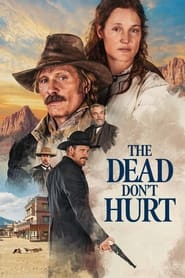A oddly passionless passion project, credit to Viggo Mortensen for centering someone other than himself in the storytelling. But does that itself make it the "feminist Western" that the filmmakers clearly wish it to be? Vivienne might have a powerful presence thanks to Vicky Krieps' fantastic performance and she may back this up with a handful of sub-Charles Portis saucy lines and endearing whimsy, but she lacks any real agency, so this ersatz Johnny Guitar (1954) never really faces the music. Simply depicting her being brutalised, even if it's presented by the film as a Bad Thing and shows she can endure her "suffering elegantly" (Ferdosa Abdi), this doesn't essay a progressive or alternative argument to the status quo.
I also worry how much of the non-chronological storytelling was informed by the recent release of Killers of the Flower Moon. If one screened the events The Dead Don't Hurt in strict chronological order, I would hazard it would feel rather weak and thin placed against Martin Scorcese's powerful neo-revisionist Western that critiques the rapacity of capitalism and patriarchy in Amerrica, even if it made a bit more sense without knowing, say, about the Schleswig-Holstein Uprising that Holger probably fought in. To quote Natalia Winkelman's review in IndieWire, the "structural ingenuity elevates a film that, otherwise, covers familiar terrain".
Still, I liked the magical realism moments, even if they were soon out by the rather cack-handed needledrops. Deploying Schubert's obvious Ständchen, even if it contains references to slender treetops rustling in the moonight ("Flüsternd schlanke Wipfel rauschen / In des Mondes Licht") just felt like another perspective of the film that hadn't been properly thought through.
Synopsis: In the 1860s, fiercely independent French-Canadian Vivienne Le Coudy embarks on a journey with Danish immigrant Holger Olsen, attempting to forge a life together in the dusty town of Elk Flats, Nevada. When Holger decides to go fight for the Union in the burgeoning Civil War, Vivienne must fend for herself, which isn't easy in a town controlled by a corrupt mayor.

